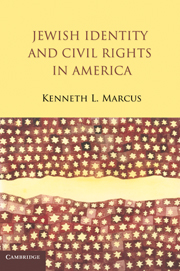Book contents
- Frontmatter
- Contents
- Acknowledgments
- Introduction
- 1 The Dilemma of Jewish Difference
- 2 The Jewish Question in Civil Rights Enforcement
- 3 The New Campus Anti-Semitism
- 4 Criticism
- 5 First Amendment Issues
- 6 Misunderstanding Jews and Jew Hatred
- 7 Institutional Resistance
- 8 The Originalist Approach
- 9 Scientific Theories
- 10 Social Perception
- 11 The Subjective Approach
- 12 Anti-Semitism as Harm to Racial Identity
- Conclusion
- Index
- References
4 - Criticism
Published online by Cambridge University Press: 05 June 2012
- Frontmatter
- Contents
- Acknowledgments
- Introduction
- 1 The Dilemma of Jewish Difference
- 2 The Jewish Question in Civil Rights Enforcement
- 3 The New Campus Anti-Semitism
- 4 Criticism
- 5 First Amendment Issues
- 6 Misunderstanding Jews and Jew Hatred
- 7 Institutional Resistance
- 8 The Originalist Approach
- 9 Scientific Theories
- 10 Social Perception
- 11 The Subjective Approach
- 12 Anti-Semitism as Harm to Racial Identity
- Conclusion
- Index
- References
Summary
To the extent that much campus anti-Semitism falls within the rubric of the “new anti-Semitism,” its discriminatory status is subject to the same criticism and controversies that have long attended to that term. Critics of the new anti-Semitism argue variously that the new anti-Semitism is not new, that it is not anti-Semitic, that it is not a serious problem, that it rests on an internal contradiction, that it suppresses academic freedom, and that it infringes on the freedom of speech. These critics, in turn, have been charged with turning a blind eye to serious bigotry, developing arguments that insulate wrongdoing from censure, and in extreme cases, succumbing to a pathology of “anti-Semitism denial,” analogous to Holocaust denial. While the criticisms vary in degree of persuasiveness, none of them succeeds in refuting the basic reality of contemporary anti-Semitism, whereas all of them provide cover for those who truly mean to render harm. Nevertheless, each criticism also contains an element of truth that must be recognized. The theory and practice of counteracting new anti-Semitism can only be strengthened by a confrontation with these critical perspectives.
The Newness Question
Some commentators argue that the “new anti-Semitism” is not really new. This argument is sometimes merely technical or academic, but it is often advanced in service of a broader agenda, for example, as evidence that the supposed resurgence is an illusory claim that has resurfaced periodically and never panned out. In 2003, a spate of books was published that announced the arrival of the new anti-Semitism. One prominent example is Never Again? The Threat of the NewAnti-Semitism, by Abraham Foxman, the Anti-Defamation League’s national director. Critics such as Norman Finkelstein have observed that this supposedly “new” anti-Semitism had been described by Foxman’s Anti-Defamation League predecessors Arnold Forster and Benjamin Epstein not less than 30 years beforehand in a volume also entitled, The NewAnti-Semitism. Indeed, it has been argued that Forster and Epstein’s volume relies on scholarship published as far back as 1968. Moreover, while some trace the new anti-Semitism to the Six Day War, others trace it back to the end of World War II.
- Type
- Chapter
- Information
- Jewish Identity and Civil Rights in America , pp. 65 - 75Publisher: Cambridge University PressPrint publication year: 2010



